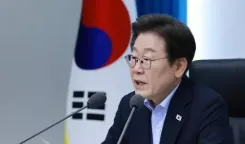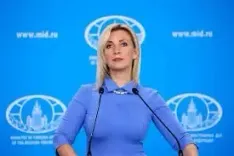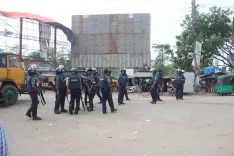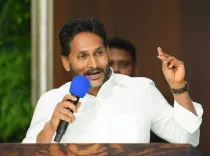How are India and the EU Strengthening Security and Defence Cooperation?
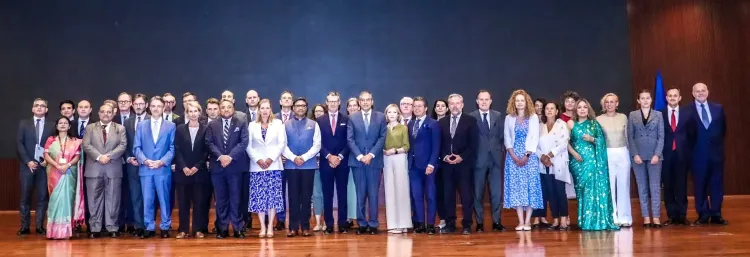
Synopsis
Key Takeaways
- Enhanced cooperation in security and defence sectors.
- Commitment to counter-terrorism and regional stability.
- Focus on the India-EU Security and Defence Partnership.
- Regular high-level dialogues and engagements.
- Exploration of defence industry collaboration.
New Delhi, Sep 12 (NationPress) India and the European Union (EU) on Friday pledged to enhance collaboration across various sectors, with a specific focus on security and defence.
Both parties expressed their satisfaction regarding the increasing political engagements at a high level and consistent sectoral interactions. This follows a meeting in New Delhi where Foreign Secretary Vikram Misri engaged with members of the visiting Political and Security Committee (PSC) of the Council of the European Union.
The 30-member PSC delegation, marking its inaugural visit to Asia, was led by Delphine Pronk, Committee Chair, and included ambassadors from EU Member States alongside officials from the European Commission and the European External Action Service.
Foreign Secretary Misri was accompanied by Deputy National Security Advisor Pavan Kapoor, Secretary (West) Sibi George, and other senior officials during the meeting.
Discussions centered on advancing India–EU cooperation in multiple sectors, particularly security and defence. Both sides reiterated their commitment to expediting the conclusion of the India-EU Security and Defence Partnership and the Security of Information Agreement. They also anticipated the India-EU FTA, with leaders assigning negotiating teams to finalize the deal by the year’s end. Additionally, perspectives on recent regional and global developments were exchanged, according to a statement from the Ministry of External Affairs (MEA).
During their two-day working visit to India, PSC members met with the Defence Secretary, received a briefing on the Information Fusion Centre – Indian Ocean Region (IFC-IOR), and engaged with representatives from the Indian defence industry.
The visit by the EU PSC builds on the momentum from the historic visit of the EU College of Commissioners to India in February 2025, reflecting a shared commitment to a more profound India–EU Strategic Partnership, as noted by the MEA.
Regular exchanges occur between India and the EU concerning security and defence through a broad bilateral dialogue framework, encompassing maritime security, cybersecurity, and counter-terrorism. Both sides are exploring opportunities for enhanced cooperation in the defence industry and manufacturing.
On September 9, India and the EU convened their 15th Meeting of the Joint Working Group on Counter Terrorism (CT) in Brussels, reaffirming their strong condemnation of terrorism in all its manifestations, including cross-border terrorism. They concurred that terrorism is a global challenge requiring coordinated and sustained action.
Co-chaired by Maciej Stadejek, Director for Security and Defence Policy in the European External Action Service, and K D Dewal, Joint Secretary (Counter-terrorism) in the Ministry of External Affairs, both sides condemned the horrific terrorist attack on April 22 in Pahalgam, with the EU expressing condolences for the loss of innocent lives.
In this context, India and the EU underscored the importance of collaboration within multilateral platforms, including the United Nations, the Global Counterterrorism Forum (GCTF), and the FATF. The dialogue allowed for a thorough exchange on domestic, regional, and global threat assessments, highlighting how instability and conflicts in various regions act as catalysts for terrorism and violent extremism, according to the MEA.
During the Dialogue, the EU and India shared updates on significant developments in their counter-terrorism policies and discussed crucial topics in the battle against terrorism. These included strategies to counter terrorist financing, prevent online radicalization, ongoing exchanges regarding the designation of terrorists and terrorist entities, and addressing the implications of emerging technologies.
The EU emphasized in a post-meeting statement that both sides shared updates on their respective counter-terrorism policies, discussing critical issues in the fight against terrorism, including measures to counter terrorism financing, prevent online radicalization, and address the implications of emerging technologies.


